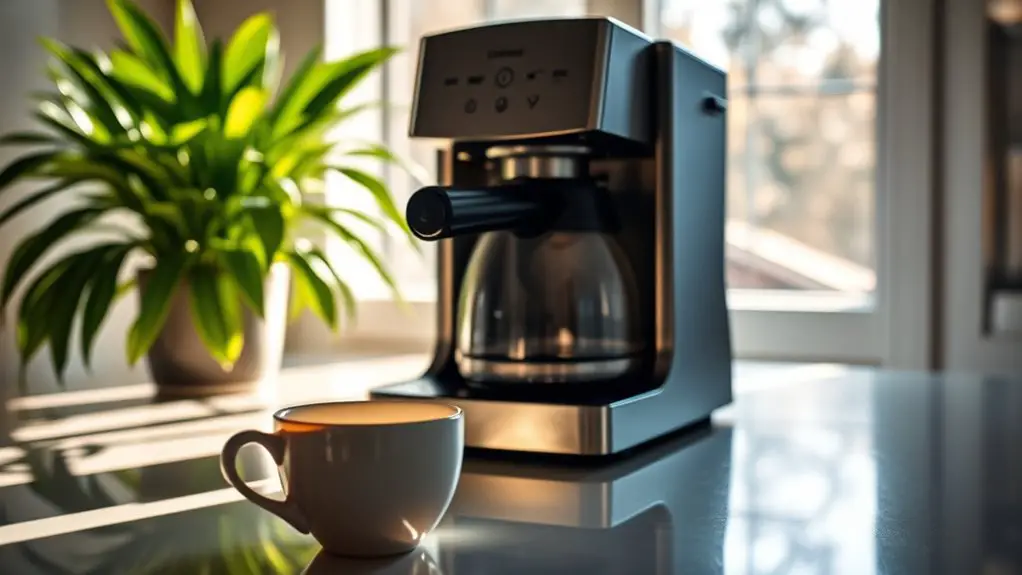Coffee makers contribute to carbon footprints in several ways. Their plastic components, derived from fossil fuels, add to greenhouse gas emissions. During brewing, about 30% of the energy is consumed, emphasizing the need for energy efficiency. Plus, improper disposal often leads to landfill waste. By being mindful of these factors, you can make eco-friendly choices. Curious about sustainable alternatives to traditional methods that can lessen this impact? You'll find some great options ahead.
The Environmental Impact of Coffee Production
While you might savor that morning cup of coffee, it is essential to recognize the environmental impact of coffee production. The practices behind coffee cultivation can have serious consequences, especially when it comes to deforestation effects. Unsustainable farming methods often lead to the clearing of vast tracts of forest, disrupting ecosystems and contributing to biodiversity loss. This isn't just about trees; it's about the delicate balance of our planet. You should consider the implications of your coffee choice—whether it supports sustainable practices or contributes to environmental degradation. By seeking out ethically sourced coffee, you can enjoy your brew while promoting responsible agriculture that respects nature, ultimately allowing you to feel a sense of freedom in your consumption choices.
Materials Used in Coffee Makers and Their Footprint
Your choice of coffee doesn't just stop at the beans; it extends to the coffee maker you use. Many makers are loaded with plastic components, which are often derived from fossil fuels, contributing considerably to their carbon footprints. While they may be lightweight and affordable, the environmental cost is steep, especially when you consider the waste generated at the end of their life cycle. On the other hand, metal sourcing for coffee makers can offer a more sustainable option, though it's not without its own challenges. Mining and processing metals can be energy-intensive. Ultimately, when you opt for a coffee maker, consider the materials involved and how they'll impact both your brew and the planet. Your choice matters!
Energy Consumption of Coffee Makers
Approximately 30% of a coffee maker's energy consumption occurs during the brewing process, making it a significant factor to contemplate when evaluating its overall environmental impact. When you're selecting a coffee maker, energy efficiency should be at the forefront of your mind. Some models consume less power during operation, which not only saves you money but also reduces your carbon footprint. Consider features like programmable timers and auto shut-off options to decrease power usage when you're not around. Remember, every cup you brew contributes to your overall energy consumption. By choosing a more efficient model, you're taking a step towards minimizing your environmental impact while enjoying your daily brew. Additionally, look for options that are designed with energy-efficient practices in mind to ensure that your choice supports sustainability. After all, freedom includes the power to make conscious choices for the planet.
Disposal and Recycling of Coffee Machines
When considering the lifecycle of a coffee maker, proper disposal and recycling become essential aspects that often get overlooked. Many folks toss their old machines without thinking about the environmental impact. You should know there are better disposal methods that can minimize waste. Many manufacturers offer recycling programs that allow you to return your old coffee maker for responsible dismantling. By participating in these programs, you contribute to reducing landfill waste and recovering valuable materials. It's not just about the coffee; it's about making conscious choices that align with a sustainable lifestyle. So, next time you're ready to part ways with your machine, remember, your choice can greatly influence its environmental footprint. Let's embrace responsibility and freedom in our coffee habits!
Sustainable Alternatives for Coffee Lovers
With a growing awareness of coffee makers' environmental impacts, many coffee lovers are searching for sustainable alternatives that don't compromise on quality. Embracing eco-friendly options can transform your morning ritual while reducing your carbon footprint. Consider using pour-over methods or French presses, which require less energy and produce minimal waste. Additionally, opt for reusable filters to cut down on single-use products. Incorporating natural vanilla extract into your coffee can enhance flavor without the added sugars found in syrups.
| Method | Benefits |
|---|---|
| Pour-Over | Minimal energy use |
| French Press | No electricity required |
| AeroPress | Compact and portable |
| Reusable Filters | Reduces waste considerably |
These choices not only align with your values but also enhance the flavor of your brew, giving you a guilt-free coffee experience.
Frequently Asked Questions
How Does Coffee Maker Design Affect Its Overall Environmental Impact?
When considering coffee maker design, you should focus on energy efficiency and material sourcing. Sustainable choices here not only reduce your environmental impact but also enhance your brewing experience, giving you freedom to enjoy guilt-free coffee.
Are There Eco-Friendly Brands of Coffee Makers Available?
Yes, you can find eco-friendly coffee makers using sustainable materials and promoting energy efficiency. Brands like Breville and Cuisinart offer models designed to minimize environmental impact while still delivering that essential morning brew you love.
What Is the Lifespan of a Typical Coffee Maker?
A typical coffee maker lasts about five to ten years, depending on its durability and your maintenance practices. Regular cleaning and careful usage can extend its life, giving you more time to enjoy your favorite brews.
Do Coffee Makers Produce Any Harmful Emissions During Operation?
Yes, coffee makers can produce harmful emissions, especially with higher energy consumption. While the emission levels might seem minimal, every bit adds up. Being mindful of your usage can help reduce your overall impact.
Can Using a Coffee Maker Affect Water Consumption?
Imagine a thirsty plant, yearning for rain. Your coffee maker's water usage can impact that balance. Brewing efficiency matters; a wasteful machine can drown your efforts to conserve, while a mindful choice nurtures sustainability.
